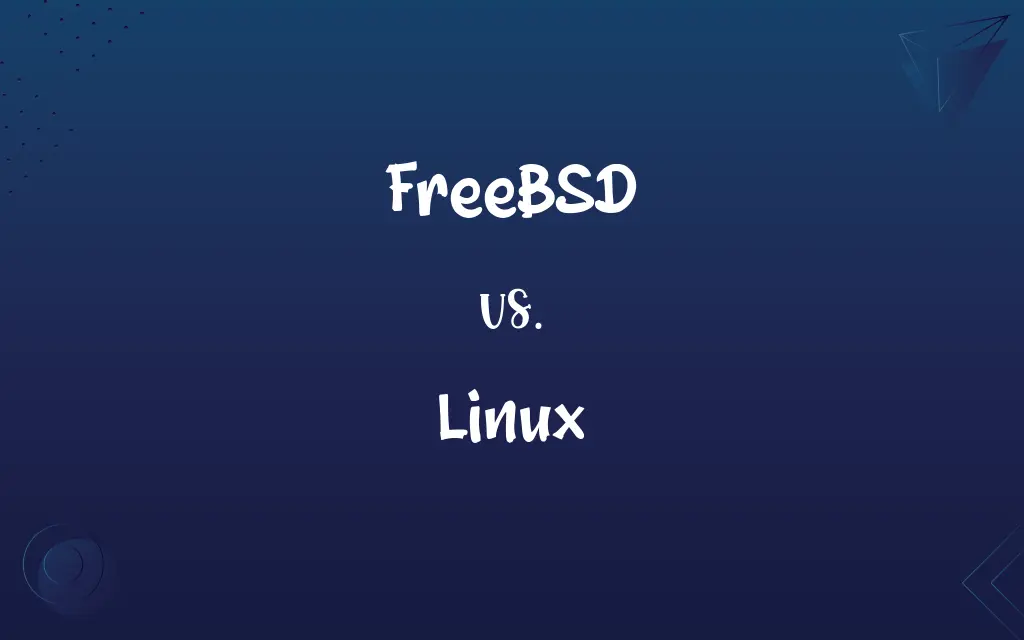FreeBSD vs. Linux: Know the Difference

By Dua Fatima & Hifza Nasir || Published on July 8, 2024
FreeBSD is a Unix-like OS focusing on advanced networking, performance, and security, mainly for servers and embedded systems. Linux is a Unix-like kernel for diverse applications across many distributions, from desktops to servers.

Key Differences
FreeBSD offers a complete operating system (OS) with a unified code base, including the kernel, device drivers, and userland utilities, developed and maintained by a single project team. This coherence ensures stability and a streamlined update process. Linux, by contrast, is just a kernel; distributions combine it with GNU and other software to create a complete OS, resulting in diverse ecosystems tailored to specific needs but with varying degrees of integration and consistency.
Hifza Nasir
Jul 08, 2024
The licensing model is another point of divergence. FreeBSD uses the permissive BSD license, allowing for the incorporation of its code into both open and closed source projects without requiring the release of source code modifications. Linux, under the GNU General Public License (GPL), mandates that any modifications to the kernel or distributed GPL-licensed software be made available under the same license, promoting open source development but restricting proprietary use.
Dua Fatima
Jul 08, 2024
FreeBSD's architecture and performance optimizations are highly regarded, especially in networking and storage, making it a preferred choice for high-performance and network-critical applications. Linux excels in hardware support, compatibility, and community-driven innovation, offering cutting-edge technologies and a wider range of software compatibility, particularly for desktop environments.
Hifza Nasir
Jul 08, 2024
Security features in FreeBSD, like the Capsicum framework and Jails, provide robust mechanisms for sandboxing applications and partitioning system resources. Linux distributions offer various security enhancements, such as SELinux and AppArmor, and benefit from the extensive scrutiny of a larger user base, potentially leading to faster vulnerability detections and patches.
Dua Fatima
Jul 08, 2024
Community support and documentation vary significantly between the two. FreeBSD's documentation is renowned for its thoroughness and quality, offering detailed guides and handbooks. Linux's documentation can be fragmented due to the multitude of distributions, but its larger user community means more forums, tutorials, and user-generated content, providing valuable support and learning resources.
Hifza Nasir
Jul 08, 2024
ADVERTISEMENT
Comparison Chart
ADVERTISEMENT
Ideal Use Case
Servers, networking, embedded
Desktops, servers, everything in between
Dua Fatima
Jul 08, 2024
Hardware Compatibility
Selective, performance-focused
Broad, including newer devices
Shumaila Saeed
Jul 08, 2024
FreeBSD and Linux Definitions
FreeBSD
A Unix-like operating system with a focus on performance and advanced networking.
FreeBSD powers Netflix's content delivery network.
Hifza Nasir
Feb 29, 2024
ADVERTISEMENT
Linux
Adopts the GPL license, ensuring modifications remain open source.
Linux's kernel modifications by any organization must be publicly shared.
Shumaila Saeed
Feb 29, 2024
FreeBSD
Offers robust security features like Jails for process isolation.
FreeBSD Jails allow for secure service segmentation.
Hifza Nasir
Feb 29, 2024
Linux
A kernel that forms the basis of various distributions, catering to a wide range of applications.
Ubuntu, a popular Linux distribution, is widely used for both desktops and servers.
Hifza Nasir
Feb 29, 2024
FreeBSD
Uses the permissive BSD license, promoting both open and closed source projects.
Parts of Apple’s macOS are based on FreeBSD.
Dua Fatima
Feb 29, 2024
Linux
Utilizes security mechanisms like SELinux for enhanced access control.
SELinux offers granular permissions management across Linux systems.
Shumaila Saeed
Feb 29, 2024
FreeBSD
Prioritizes code cleanliness and architecture optimization.
FreeBSD's TCP/IP stack is renowned for its efficiency and reliability.
Shumaila Saeed
Feb 29, 2024
Linux
Boasts extensive hardware support and community-driven development.
Linux distributions often provide the latest drivers and software.
Dua Fatima
Feb 29, 2024
FreeBSD
Known for its comprehensive documentation and handbooks.
The FreeBSD Handbook is a revered resource for system administrators.
Dua Fatima
Feb 29, 2024
Linux
Offers flexibility through a wide variety of distributions.
From lightweight distros like Lubuntu to enterprise solutions like Red Hat.
Hifza Nasir
Feb 29, 2024
Repeatedly Asked Queries
What is FreeBSD best used for?
FreeBSD is best used for servers, networking applications, and embedded systems where performance and advanced networking features are critical.
Hifza Nasir
Jul 08, 2024
Which is more secure, FreeBSD or Linux?
Both offer robust security features; FreeBSD with Jails and the Capsicum framework, and Linux with SELinux and AppArmor. The choice depends on specific use cases and administrative expertise.
Hifza Nasir
Jul 08, 2024
Can FreeBSD applications run on Linux and vice versa?
With compatibility layers (like FreeBSD’s Linux compatibility layer) and cross-platform software, some applications can run on both, but direct compatibility is not inherent.
Dua Fatima
Jul 08, 2024
How do FreeBSD and Linux handle hardware compatibility?
Linux supports a broader range of hardware out of the box, thanks to its larger user base and commercial support. FreeBSD focuses on performance and may offer selective but highly optimized hardware support.
Hifza Nasir
Jul 08, 2024
Is FreeBSD or Linux better for beginners?
Linux, due to its wide range of user-friendly distributions and extensive community support, is generally considered more accessible to beginners.
Hifza Nasir
Jul 08, 2024
Are there any commercial entities behind FreeBSD and Linux?
While FreeBSD is primarily supported by a nonprofit foundation, various commercial entities actively contribute to Linux development, including Red Hat, Google, and IBM.
Shumaila Saeed
Jul 08, 2024
Which operating system is faster, FreeBSD or Linux?
Performance can depend on the specific workload and system configuration. FreeBSD is often praised for its networking and storage performance, while Linux can provide better performance on a wider range of hardware configurations.
Dua Fatima
Jul 08, 2024
What is the update process like for FreeBSD vs. Linux?
FreeBSD offers a unified update process for the entire system, whereas Linux updates can vary by distribution, with some using centralized repositories and others requiring manual compilation.
Shumaila Saeed
Jul 08, 2024
Can I use Linux software on FreeBSD?
Yes, FreeBSD's Linux binary compatibility layer allows many Linux binaries to run on FreeBSD, though native solutions and compatibility might vary.
Dua Fatima
Jul 08, 2024
How do FreeBSD and Linux compare in terms of community support?
Linux has a larger and more diverse community, providing extensive support options. FreeBSD’s community is smaller but is known for its expertise and commitment to the FreeBSD project.
Hifza Nasir
Jul 08, 2024
What sets Linux apart from FreeBSD?
Linux's main distinction is its wide application range, supported by a variety of distributions, extensive hardware compatibility, and a large, active community.
Dua Fatima
Jul 08, 2024
Which has better documentation, FreeBSD or Linux?
FreeBSD is known for its comprehensive and cohesive documentation. Linux documentation quality can vary by distribution but is extensive across the community and internet.
Dua Fatima
Jul 08, 2024
How does the licensing difference between FreeBSD and Linux affect users?
FreeBSD's BSD license allows for greater flexibility in incorporating code into both open and proprietary projects without disclosing source code. Linux's GPL ensures that all modifications are open source, promoting transparency and community contributions.
Dua Fatima
Jul 08, 2024
Share this page
Link for your blog / website
HTML
Link to share via messenger
About Author
Written by
Dua FatimaCo-written by
Hifza Nasir








































































